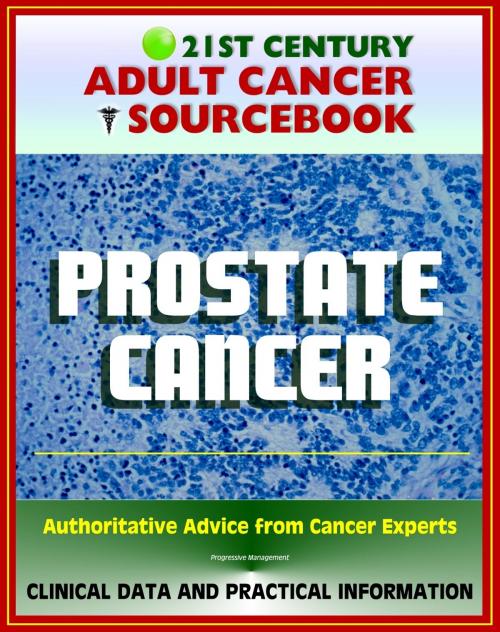21st Century Adult Cancer Sourcebook: Prostate Cancer - Clinical Data for Patients, Families, and Physicians
Nonfiction, Health & Well Being, Health, Ailments & Diseases, Cancer| Author: | Progressive Management | ISBN: | 9781466069206 |
| Publisher: | Progressive Management | Publication: | October 25, 2011 |
| Imprint: | Smashwords Edition | Language: | English |
| Author: | Progressive Management |
| ISBN: | 9781466069206 |
| Publisher: | Progressive Management |
| Publication: | October 25, 2011 |
| Imprint: | Smashwords Edition |
| Language: | English |
Authoritative information and practical advice from the nation's cancer experts about prostate cancer includes official medical data on signs, symptoms, early detection, diagnostic testing, risk factors and prevention, treatment options, surgery, radiation, drugs, chemotherapy, staging, biology, prognosis, and survival, with a complete glossary of technical medical terms and current references. Every topic about prostate cancer is covered: the PSA test, digital rectal exam (DRE), screening issues, biopsy procedures, stage and grade, Gleason score, prostatectomy, radiation therapy, watchful waiting, hormone therapy, chemotherapy, biologic therapy, cryosurgery, Provenge vaccine, and much more.
Starting with the basics, and advancing to detailed patient-oriented and physician-quality information, this comprehensive in-depth compilation gives empowered patients, families, caregivers, nurses, and physicians the knowledge they need to understand the diagnosis and treatment of prostate cancer.
Comprehensive data on clinical trials is included - with information on intervention, sponsor, gender, age group, trial phase, number of enrolled patients, funding source, study type, study design, NCT identification number and other IDs, first received date, start date, completion date, primary completion date, last updated date, last verified date, associated acronym, and outcome measures.
Prostate cancer is a disease in which malignant (cancer) cells form in the tissues of the prostate. The prostate is a gland in the male reproductive system located just below the bladder (the organ that collects and empties urine) and in front of the rectum (the lower part of the intestine). It is about the size of a walnut and surrounds part of the urethra (the tube that empties urine from the bladder). The prostate gland produces fluid that makes up part of the semen.
Prostate cancer is found mainly in older men. As men age, the prostate may get bigger and block the urethra or bladder. This may cause difficulty in urination or can interfere with sexual function. The condition is called benign prostatic hyperplasia (BPH), and although it is not cancer, surgery may be needed to correct it. The symptoms of benign prostatic hyperplasia or of other problems in the prostate may be similar to symptoms of prostate cancer.
Normal prostate and benign prostatic hyperplasia (BPH). A normal prostate does not block the flow of urine from the bladder. An enlarged prostate presses on the bladder and urethra and blocks the flow of urine.
Possible signs of prostate cancer include a weak flow of urine or frequent urination. These and other symptoms may be caused by prostate cancer. Other conditions may cause the same symptoms. A doctor should be consulted if any of the following problems occur:
* Weak or interrupted flow of urine.
* Frequent urination (especially at night).
* Trouble urinating.
* Pain or burning during urination.
* Blood in the urine or semen.
* A pain in the back, hips, or pelvis that doesn't go away.
* Painful ejaculation.
Extensive supplements, with chapters gathered from our Cancer Toolkit series and other reports, cover a broad range of cancer topics useful to cancer patients. This edition includes our exclusive Guide to Leading Medical Websites with updated links to 81 of the best sites for medical information, which let you quickly check for updates from the government and the best commercial portals, news sites, reference/textbook/non-commercial portals, and health organizations. Supplemental coverage includes:
Levels of Evidence for Cancer Treatment Studies
Glossary of Clinical Trial Terms
Clinical Trials Background Information and In-Depth Program
Clinical Trials at NIH
Authoritative information and practical advice from the nation's cancer experts about prostate cancer includes official medical data on signs, symptoms, early detection, diagnostic testing, risk factors and prevention, treatment options, surgery, radiation, drugs, chemotherapy, staging, biology, prognosis, and survival, with a complete glossary of technical medical terms and current references. Every topic about prostate cancer is covered: the PSA test, digital rectal exam (DRE), screening issues, biopsy procedures, stage and grade, Gleason score, prostatectomy, radiation therapy, watchful waiting, hormone therapy, chemotherapy, biologic therapy, cryosurgery, Provenge vaccine, and much more.
Starting with the basics, and advancing to detailed patient-oriented and physician-quality information, this comprehensive in-depth compilation gives empowered patients, families, caregivers, nurses, and physicians the knowledge they need to understand the diagnosis and treatment of prostate cancer.
Comprehensive data on clinical trials is included - with information on intervention, sponsor, gender, age group, trial phase, number of enrolled patients, funding source, study type, study design, NCT identification number and other IDs, first received date, start date, completion date, primary completion date, last updated date, last verified date, associated acronym, and outcome measures.
Prostate cancer is a disease in which malignant (cancer) cells form in the tissues of the prostate. The prostate is a gland in the male reproductive system located just below the bladder (the organ that collects and empties urine) and in front of the rectum (the lower part of the intestine). It is about the size of a walnut and surrounds part of the urethra (the tube that empties urine from the bladder). The prostate gland produces fluid that makes up part of the semen.
Prostate cancer is found mainly in older men. As men age, the prostate may get bigger and block the urethra or bladder. This may cause difficulty in urination or can interfere with sexual function. The condition is called benign prostatic hyperplasia (BPH), and although it is not cancer, surgery may be needed to correct it. The symptoms of benign prostatic hyperplasia or of other problems in the prostate may be similar to symptoms of prostate cancer.
Normal prostate and benign prostatic hyperplasia (BPH). A normal prostate does not block the flow of urine from the bladder. An enlarged prostate presses on the bladder and urethra and blocks the flow of urine.
Possible signs of prostate cancer include a weak flow of urine or frequent urination. These and other symptoms may be caused by prostate cancer. Other conditions may cause the same symptoms. A doctor should be consulted if any of the following problems occur:
* Weak or interrupted flow of urine.
* Frequent urination (especially at night).
* Trouble urinating.
* Pain or burning during urination.
* Blood in the urine or semen.
* A pain in the back, hips, or pelvis that doesn't go away.
* Painful ejaculation.
Extensive supplements, with chapters gathered from our Cancer Toolkit series and other reports, cover a broad range of cancer topics useful to cancer patients. This edition includes our exclusive Guide to Leading Medical Websites with updated links to 81 of the best sites for medical information, which let you quickly check for updates from the government and the best commercial portals, news sites, reference/textbook/non-commercial portals, and health organizations. Supplemental coverage includes:
Levels of Evidence for Cancer Treatment Studies
Glossary of Clinical Trial Terms
Clinical Trials Background Information and In-Depth Program
Clinical Trials at NIH















